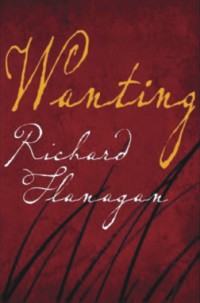|
Book Review
Wanting
Brian Doyle
 Thesis for debate in a pub: One hallmark of a fine novelist is his or her unwillingness to write novels of the same stripe; or, in other words, one thing you can say about fine novelists is that they are devilishly hard to pigeonhole. (I hear one barking objection already, to which I answer that series of novels starring the same characters are really one long novel, yes?) Thesis for debate in a pub: One hallmark of a fine novelist is his or her unwillingness to write novels of the same stripe; or, in other words, one thing you can say about fine novelists is that they are devilishly hard to pigeonhole. (I hear one barking objection already, to which I answer that series of novels starring the same characters are really one long novel, yes?)
The accomplished Australian novelist Richard Flanagan is a good example of this Multifarious Theory. In the last 15 years he has written novels about a convict in the British gulag in Australia, a not-terrorist being hunted in the 21st century, a haunted Slovenian immigrant family, and a river guide. All you can say with accuracy about Flanagan the novelist is that he writes about human beings under duress, and that his tales are often set in Tasmania, which is understandable, as he is a lifelong resident of that remote "island of which few have ever heard," as he has said. And his new novel, "Wanting," while set partly in Tasmania, is a leap in another new direction. Featuring the literary polymath Charles Dickens, the Arctic explorer Sir John Franklin and an aboriginal Australian girl named Mathinna, "Wanting" is about desire and its straitjackets, desire and illusion, desire as a force that sows as much pain as it does joy.
Flanagan has used history before as a jumping-off point -- "Gould's Book of Fish," his masterpiece, lifts the real English forger William Gould out of obscurity and imagines him as a mad genius amid the horror of an island penal colony off Tasmania -- but here Flanagan takes Sir John and his wife, Lady Jane, Dickens and his wife, Catherine, and eventual mistress, Ellen Ternan, writer Wilkie Collins and other 19th-century personages, and imagines how they might have been linked. The Franklins, governing Tasmania between Sir John's epic voyages, become enamoured of a native child, the bright and charismatic Mathinna, and dream of grooming (or manipulating) her into their vision of cultured poise; but their idea of Mathinna has little to do with the real human being, and the weight of their desire sends the girl into free-fall.
Years later Lady Jane Franklin, unable to admit the damage done to Mathinna or to countenance the theory that her husband's third expedition to the Arctic has ended in cannibalism and death, persuades Dickens to attack such an unacceptable idea. Dickens does so with his usual brilliance, in part because he, too, is trapped in a cold country, his lifeless marriage, and will not, cannot, admit that he craves love ...
"He bound and chained (his heart)," Flanagan writes, "buried it deep, and only such severe disciplining of his heart allowed him his success. Prevented him from falling into the abyss like his debtor father, like his wastrel brothers; from becoming, finally, the savage he feared himself to be ..." Dickens himself, in 1854, musing at his desk one morning, world-famous, rich and filled with wordless despair: "The mark of wisdom and civilization was the capacity to conquer desire, to deny it and crush it ..."
A man of prodigious energy, Dickens bends his furious creativity and pain into a play sparked by the fate of the Franklin expedition, "The Frozen Deep," even taking a leading part and earning rave reviews for his acting. Choosing the cast for his drama, he falls in love with the young actress with whom he will secretly spend the rest of his life.
Flanagan is a novelist of such gifts that a recitation of his plot is only a hint of the layered pleasures of his prose, in which action and voices and dreams and hints all swirl in a blunt yet lyrical style utterly his own. "Wanting" is a meditation on the nature and character of the Tasmanian landscape and its bloody history; and it is an exploration of the ways human beings imprison themselves emotionally, and label their prisons reason, science, religion; and it is a musing on illusions and lies, on the awful and wonderful implications of desire. "That which is wanting cannot be numbered," as the anonymous genius who wrote the book of Ecclesiastes says, but Flanagan has memorably imagined some of those men and women, in their journey to and from the frozen deep, in a remarkable book that shivers in the heart long after the last page.
This review first appeared in The Oregonian.
Copyright
(R) thedailystar.net 2009
|
| |
